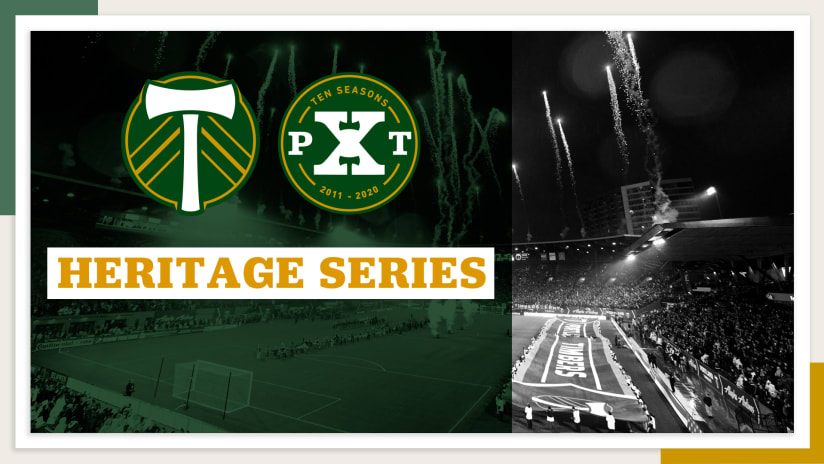PORTLAND, Ore. – It was 4 a.m. when Brian Williams left his home in Beaverton, Oregon, joining another of the 25 people he and his wife, Marianna Dubova, shared a section with at PGE Park. 108 is in the heart of the supporters end in Goose Hollow, and in 2005, ahead of the Portland Timbers’ fifth season in the United Soccer League, the couple began their residency, there. By 2008, they were season-ticket holders, and in 2012, they added a third ticket to their allotment.
Over that time, what was once known as Civic Stadium went from PGE Park to Jeld-Wen Field, then changed again to Providence Park. The team they followed saw their league change names before the club moved up a division, changed leagues and won a title. And since 2013, that club’s added two more professional teams, one in the National Women’s Soccer League and a second that rejoined the United Soccer League.
Perhaps some predicted Major League Soccer success when, on Thursday, April 14, 2011, Williams left his Beaverton home, drove to Goose Hollow and camped on a sidewalk, in line for Portland’s first MLS game, but the scope of the Timbers’ growth couldn’t have been anticipated. A second team, one that’s produced two titles. Then a third team, producing new first-division talents. A growing Academy incorporating the area’s youth and a public service arm that has become an exemplar within MLS. Few of those realities were conceivable when fans began lining up for that evening’s game against the visiting Chicago Fire, but almost all of them can be traced back to that night, and the success the city produced.
In the moments Williams left his home, though, none of those outcomes matters. Nobody was looking beyond that night. Timbers fans had waited for their moment over the previous two years, since Major League Soccer confirmed their expansion spot, as well as in the years before, when a new ownership group had made its first-division push. The slow build to the first MLS home game included two more years at USL, the remodeling and expansion of their downtown venue, and three road games to start the 2011 season. With only a March 29 U.S. Open Cup qualifier at the University of Portland’s Merlo Field to placate them, Timbers fans had to endure a prolonged buildup.
By that Thursday’s early hours, the line outside Jeld-Wen Field had started to build, greeting MLS' arrival with an infamous part of Portland's culture.
“[The] line was already a couple hundred people long,” Dubova remembers Williams telling her. Four o’clock may have seemed early when he left Beaverton, but for those already extending from one of the stadium’s entrances, it was scarcely early enough.
“They took golf umbrellas to stay as dry as possible,” Dubova says. “It was pouring down rain. About eight friends from our group were already in line. They took turns all day going off to get food and use restrooms.”
Darryl Handasyde, another season-ticket holder since the beginning of the MLS era, wasn’t among those in Jeld-Wen’s early line. “Being a weekday, it started as a day in the office,” he remembers, but he also left work early, hoping to grab a pint with friends before going into the park. “Being the first home match as an MLS team was certainly an accomplishment worth celebrating,” yet by the time he got to Goose Hollow, the line outside Gate 3 was already imposing. Instead of heading to a bar, he decided to “[join] friends outside the stadium instead.”
“I never thought that things would be too different to our times at games throughout years past,” he says. MLS was different, though.
The lines were the first sign. The stadium, expanded and refurbished from its minor-league baseball feel, was the third, giving the Timbers’ a true soccer home. In between, though, was the rain, not necessarily a surprise, but an omen. A downpour that left scarves soaked by the time gates opened became a point of pride. Yes, Portland residents knew rain, but if you were on this ride with the Timbers, the weather said – if you were ready to become as dedicated as the fans’ future asked – you’d spend the day soaked. Even by Portland standards, the rain was a lot.
“I waited for several hours and did my best to stay dry,” Drayden Farci recalls, “but my umbrella was small, and it was awkward to hold it in a line of people.” Farci was a high school senior at the time and a regular at games with his father, Anatole. But he was also underage, unable to seek shelter among local bars, and concedes he did not “[have] many friends who were as excited about the Timbers as I was …”
“I dropped my things off at home before driving to the MAX stop and crossing the river,” he says. “When I arrived, the line stretched from Gate 2 to just beyond the team store. I arrived around 3 p.m. and waited until the gates opened closer to 5:30 p.m. or 6 p.m. By the time we were let inside, my scarf was soaked through.”
By the arrival of the Timbers’ first MLS game, the city’s anticipation had grown, with an army of new and future supporters willing to give the city’s second major sports team a chance. But the city was far different than it is now, after a decade of professional play had sown one of the most fervent soccer environments in the country. Back then, the legacy the North American Soccer League, the persistence of the University of Portland’s excellence, and the loyalty of fans throughout the United Soccer League era had provided but a platform. Even then, Portland was considered a hotbed. But much of the city’s mainstream sports culture was keeping its mind open.
Undoubtedly, many of those minds were convinced when gates opened. A month into the 2011 MLS season, it was the first time fans saw their newly updated venue – a stadium redesigned with the Timbers in mind. They also saw their ranks, which had grown dramatically after 2009’s MLS confirmation, grow dramatically again, so much so a sellout streak that persists to this day was able to greet the team’s first home moments.
“Entering the North End and seeing the changes to the east and south of the stadium in person was amazing,” Handasyde says. “Sure, we’d all seen pictures online, but having been to PGE Park for so many years, it was a dramatic transformation. The lower bowl of the North End seemed to be filling up rapidly, and it certainly seemed like things were louder than before. The atmosphere was building with a feverish excitement.”
For almost four years, since he assumed control of the Timbers in May of 2007, Merritt Paulson had time to think of the moment – his dream of bringing MLS soccer to Portland becoming a reality. With those dreams, though, came fears, produced as much by time and anticipation as the pragmatism of his chosen business.
“I had been a little worried,” the team’s owner admits now, when asked about his expectations for the first match. “You never know, right? Everybody’s worst nightmare in this business is you throw a party and nobody shows up. We were well-attended as a USL team – I knew we had supporters’ culture – but people falsely remember how big our gates were in the USL era. They weren’t that big. They were bigger than Seattle’s, and we had a real supporters’ section, but you’d have a thousand people in the Army and 1,500 people or 2,500 people in the rest of the stadium, a lot of nights.
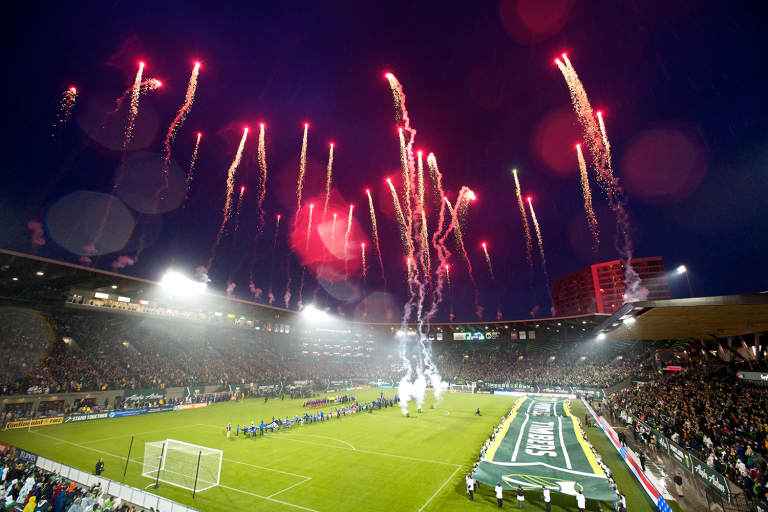
Opening night fireworks on April 14, 2011 (Photo: Craig Mitchelldyer / Portland Timbers)
“That definitely got bigger in 2010 with the MLS hype. We were going well with season-ticket deposits, and we ended up selling more season tickets than we’d anticipated, for sure. But I just remember the discussions about ticket pricing, and me pushing [Timbers President of Business] Mike [Golub] and [Vice President of Ticket Sales] Joe [Cote]. They wanted to have higher prices than what I wanted. I wanted to make sure that – the worst thing I thought we could possibly do is not sell out, not create that good first impression and [not] have that sense of scarcity in being able to get a ticket. I do remember that quite clearly.”
For Paulson, the night was as much ceremony as celebration, the former occupying his time past the evening’s kickoff. His four-year grind meant the Timbers’ league debut was as much about other stakeholders as himself. The fans were the central force, having provided evidence of the community’s commitment, but come April 2011, the number of civic leaders, partners and dignitaries had bloomed. If all went as planned, the game would be a historic moment for Portland. Everybody wanted on the ground.
“I had a whole bunch of people in to see it – friends and family,” Paulson remembers. “We had a reception at the [Multnomah Athletic Club] of all the people who’d worked on MLS and different elected officials, people in the private sector, big sponsors. I spoke at it. I think I gave a really bad speech. I was so nervous about the game. I had that going on. I was hosting people, and I had to give the talk on the field as well.
“It was busy leading up to the game, for sure. I would have rather just been like that than have time to think before kickoff.”
Paulson’s time leading up to the game was also occupied by his team’s plight on the field. 2011’s other expansion team, the Cascadia rival Vancouver Whitecaps FC, had their home opener a month earlier, a 4-2 win over their cross-country benchmark, Toronto FC. Though it would be three more months until the Whitecaps lodged their second win in MLS, their home opener stayed in Paulson’s thoughts, with Portland fans mindful of their team’s 0-2-1 start.
“The few fellow fans I worked with all had opinions about the season, so far,” Handasyde admits, “and the office banter centered around the upcoming game.”
“Yeah, we hadn’t won ...,” Paulson offers as his first memory of the game’s context. “I was very cognizant of the fact that Vancouver had won their home opener in their temporary facility, and [the] Seattle [Sounders] had won their home opener [in 2009] ...
“I was extremely nervous about an outcome where we didn’t play well and we laid an egg on the field. I remember that quite vividly, and it was a rainy night, a really wet night. I think it’s the only time I’ve addressed a crowd before a game, along with [former Portland mayor] Sam Adams, and I had some quote – we were playing the Chicago Fire, and something about the rain extinguishing the Fire – some cheesy line like that – which given the acoustics of the stadium and the noise of the fans, I doubt anyone even heard. That’s what I remember.”
The fans proved the night’s first big result, as well as its most enduring one. “I was interested to see how the Army was going to actually manifest when the new stadium,” Paulson admits. The Timbers Army was very real at the time, but didn’t have the numbers we see now. Almost immediately, though, in those first moments of Jeld-Wen Field’s reopening, the Army showed its growth.
“There were more people than I had ever seen inside the stadium,” Farci says.
“What I remember most is the collection of dark green, gray, and black rain coast covered by green and white scarves. This was before there were 20 different jackets available for purchase, or 200 scarves, each meaning something unique, important, and different. The unison among the fans was great.”
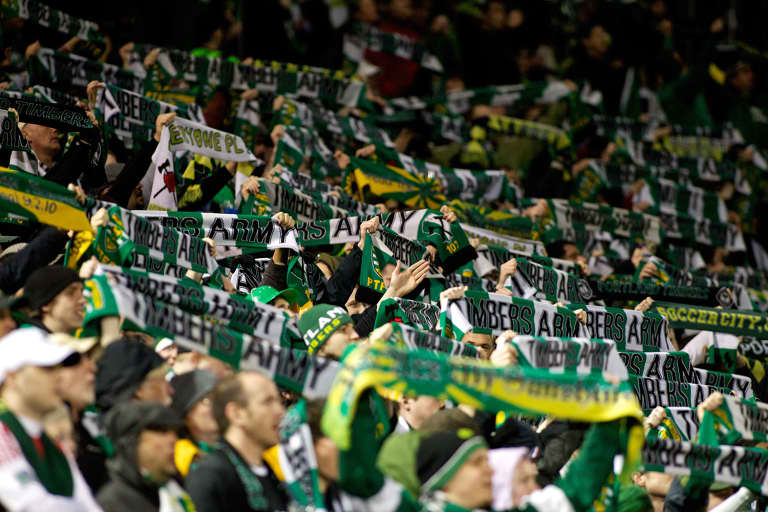
The Timbers Army on April 14, 2011 (Photo: Craig Mitchelldyer / Portland Timbers)
“The TA leading the singing of our national anthem was something very special,” Dubova says. Goosebumps! To this day, I remember that match as being one of the loudest events I’ve ever been to. My ears were ringing and my voice was almost gone.
“As my husband puts it, ‘two words come to mind about that night: pandemonium and delirium.’”
The peak of each came just under 29 minutes into the game, when a pass downfield off the outside of winger Kalif Alhassan’s right foot put Jorge Perlaza behind a high Chicago Fire defensive line. Beating his man into the penalty box then cutting back onto his right foot, to avoid both an oncoming goalkeeper and trailing defender, Perlaza became the answer a cornerstone question: Who scored the team’s first MLS goal at home?
“I remember it well,” Perlaza says. “Everyone wanted to see what Portland would have, which players [would] make a difference. I was given the chance to score the first goal, and it’s something that gives a lot of joy, a lot of pride. It was a spectacular moment for me.”
“[Perlaza] was one of my favorite players on that team,” Paulson admits. “I just remember going ballistic.”
By halftime, Portland had doubled their lead though a player who’d go on to win a title with the club four years later, Costa Rican international Rodney Wallace. Perlaza completed his brace minutes after halftime before Chicago put a scare into their hosts, using a Portland own goal and a tally from Marco Pappa to reduce the lead to one. In the 84th minute, the Timbers secured their victory, with a second own goal going Portland’s way to seal the 4-2 result.
“The emotional toll was high in the second half ...,” Handasyde admits, “but to get the two-goal cushion and bring things to 4-2, the relief was felt immediately, and the stadium was just buzzing.”
“It just was a dream start,” Paulson says. “It was an entertaining game. We got a victory. I felt like everything moved not only according to plan but better than plan.
“It just felt like there had been such an arduous buildup. It was a little bit of a moment of release. I normally don’t sleep well after games because I’m too wound up and reliving games and rewatching games when I go home, to see what the broadcast was like. That night, I just passed out and probably slept 12 hours.”
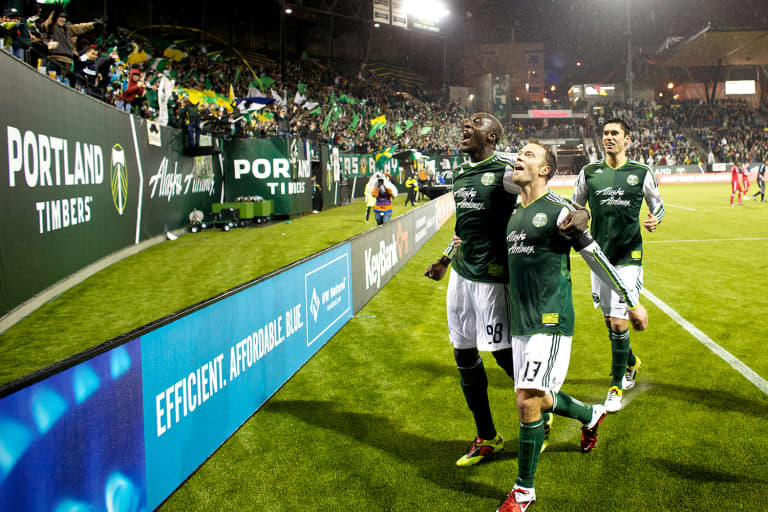
Defender Futty Danso and midfielder Jack Jewsbury celebrate the Timbers' fourth goal (Photo: Craig Mitchelldyer / Portland Timbers)
There are results like 2015’s victory at Crew Stadium that will be remembered mostly for what happened on their field. The 5-2 win at the LA Galaxy in the lead-up to that Cup triumph is also remembered for the team’s play, not the spectacle around it. Yet for all the good that happened on the field that 2011 night, the most impactful memories transcend Jorge Perlaza and Rodney Wallace; captain Jack Jewsbury and mainstay Futty Danso; head coach John Spencer or Merritt Paulson.
The rain, people remember first, as well as the state of their scarves. The lines. How they spent the day leading into their first MLS moments. The site of a new park, whose promises had been made years before. The growth of the Army. The singing of the anthem. The fireworks that announced a new era. The Timbers could have lost that game and summoned questions about the squad they’d assembled, but the bigger victory would have been the same. On one night in 2014 – on a Thursday and over of the course of just a few hours – Timbers fans addressed any doubts that lingered about the city’s MLS commitment. Soccer was going to explode again in Portland.
“Every downpour of rain,” Dubova remembers, “would start another round of ‘let it rain, let it pour, let the Portland Timbers score.’”
The evidence of Portland’s success is not only in the game’s growth but in those who have stuck around, strengthening their bonds with the club they supported before MLS’ arrival. Handasyde remains a Timbers ticket holder to this day, celebrating his own decade with U.S. Soccer’s first division. Dubova and Williams have not only expanded their season-ticket allotment but have been inspired to open their own bar, partnering with a fellow TA member to open Nebulous Tap Room on Beaverton-Hillsdale Highway. Farci, in his adulthood, has moved across the country but remains an annual member, sharing his fandom with his father and brother.
For each of them, soccer didn’t start with MLS. It was just the next stage. But over Portland’s decade at the top level, that stage has proven more successful than anybody could have known. It was all unveiled that 2011 night in Goose Hollow. It continues this weekend against Minnesota (4:30pm PT, FS1).
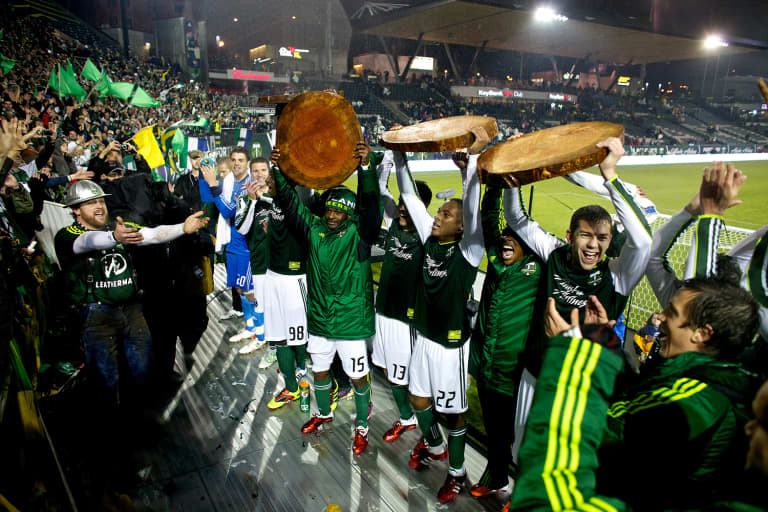
The Timbers players raise their victory logs following the 4-2 win over Chicago. (Craig Mitchelldyer / Portland Timbers)

